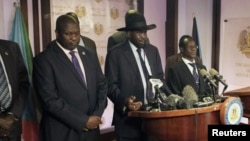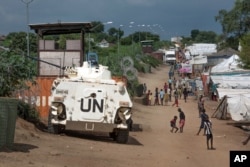Following 20 months of violence in South Sudan, a peace agreement was signed in August 2015 that was intended to stop fighting between the rival forces of President Salva Kiir and his former first vice-president Riek Machar's SPLM-IO.
But disagreements continued and new violence engulfed Juba in July, although a tenuous cease-fire is holding in the capital city.
As South Sudan continues to reel from conflict, regional bloc IGAD, the African Union and United Nations are trying to find a solution, including considering a proposal to send in a regional protection force to complement the U.N. Mission in South Sudan.
Within this environment of instability, many are wondering whether the peace agreement is even relevant at this point.
'Peace agreement in a coma'
SPLM-IO Acting Representative to Kenya Lam Jock said Kiir’s forces are still targeting Riek Machar, a major reason why he believes the peace agreement is on shaky footing. “The peace agreement is in a coma. It is in ICU,” he said.
A request for a response from Kiir’s spokesman went unanswered.
Retired Sudanese ambassador and U.N. official Nureldin Satti expresses hope South Sudan can still "pick up the pieces" and the August 2015 peace agreement can be salvaged.
“But of course, patients do not stay for too long in an ICU,” said Satti. “They have to come out of it sooner than later. Preferably not to the graveyard, of course. They will come back to normal life.”
But Steve McDonald, global fellow at the Washington-based Woodrow Wilson International Center for Scholars, is skeptical the 2015 peace deal will ever know a “normal life,” given the July outbreak of violence in Juba, and Machar’s subsequent departure.
“Even though international players, including regional players, IGAD and the AU, are trying to pull things back to together again, I have very little hope that the peace agreement between Machar and Kiir can ever work,” said McDonald.
Satti said the security situation must be stabilized in South Sudan before meaningful progress can take place, and in the interest of the country and its long-term prospects, he says Kiir and Machar must reconcile their differences.
“But as I always say, security measures alone are not enough. We have to find political solutions to problems, as we all know,” he said.
Economy issue
Horn of Africa research associate at London-based Chatham House, Ahmed Soliman, urges South Sudan’s economy also be prioritized, because it affects security and political issues. He references the more than 600 percent inflation rate in the country during the past year.
“You have seen people, civil servants and others not being paid for many months, growing costs of water and fuel and even within the protection of civilian sites, people struggling very much to be able to feed themselves, and a lack of payment for the armed forces has contributed to the unrest and kind of escalating criminality in Juba and elsewhere,” said Soliman.
And with respect to the people with guns, former British ambassador to Sudan Alan Goulty said a solution will likely not be found until they acknowledge a better way forward.
“And at the moment, there’s no alternative,” said Goulty. “If you put down your gun, where are you going to find employment or income or a way of sustaining your family?”
The country now waits to learn whether the U.N. Security Council will adopt a resolution circulated by the United States authorizing 4,000 peacekeepers for Juba.






